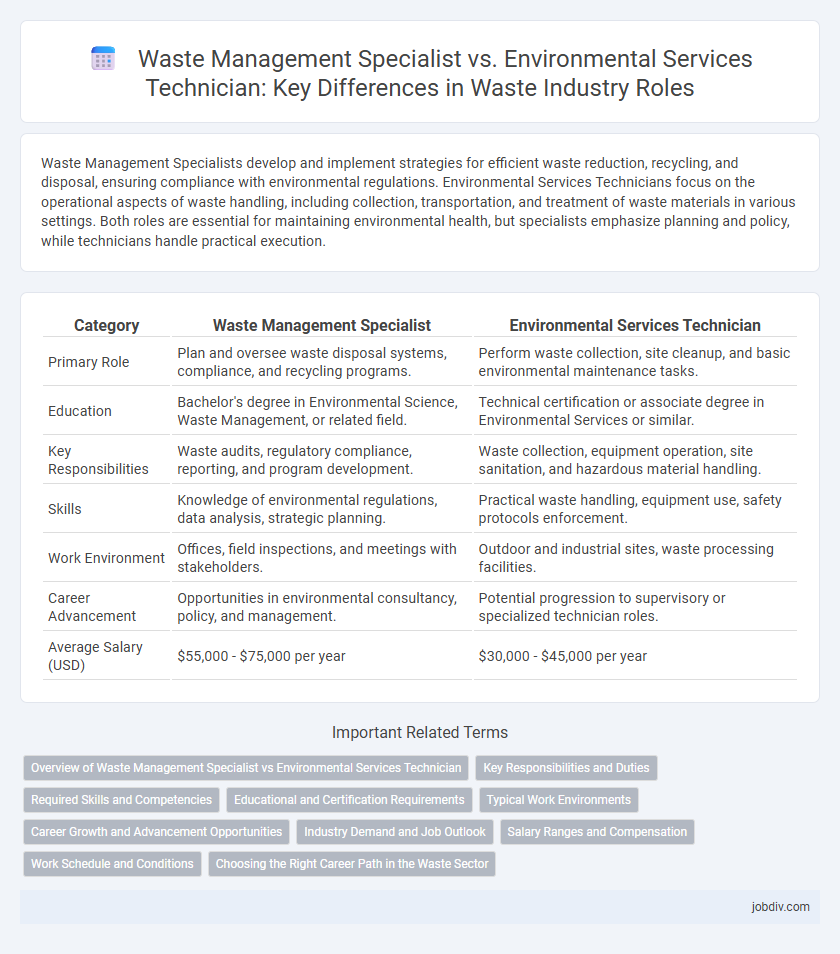Waste Management Specialists develop and implement strategies for efficient waste reduction, recycling, and disposal, ensuring compliance with environmental regulations. Environmental Services Technicians focus on the operational aspects of waste handling, including collection, transportation, and treatment of waste materials in various settings. Both roles are essential for maintaining environmental health, but specialists emphasize planning and policy, while technicians handle practical execution.
Table of Comparison
| Category | Waste Management Specialist | Environmental Services Technician |
|---|---|---|
| Primary Role | Plan and oversee waste disposal systems, compliance, and recycling programs. | Perform waste collection, site cleanup, and basic environmental maintenance tasks. |
| Education | Bachelor's degree in Environmental Science, Waste Management, or related field. | Technical certification or associate degree in Environmental Services or similar. |
| Key Responsibilities | Waste audits, regulatory compliance, reporting, and program development. | Waste collection, equipment operation, site sanitation, and hazardous material handling. |
| Skills | Knowledge of environmental regulations, data analysis, strategic planning. | Practical waste handling, equipment use, safety protocols enforcement. |
| Work Environment | Offices, field inspections, and meetings with stakeholders. | Outdoor and industrial sites, waste processing facilities. |
| Career Advancement | Opportunities in environmental consultancy, policy, and management. | Potential progression to supervisory or specialized technician roles. |
| Average Salary (USD) | $55,000 - $75,000 per year | $30,000 - $45,000 per year |
Overview of Waste Management Specialist vs Environmental Services Technician
Waste Management Specialists design and implement strategies for efficient waste collection, recycling, and disposal, emphasizing regulatory compliance and sustainability goals. Environmental Services Technicians focus on hands-on waste handling, facility sanitation, and monitoring environmental conditions to maintain health and safety standards. Both roles contribute critically to waste reduction, but Specialists engage in planning and policy development while Technicians execute operational tasks on the ground.
Key Responsibilities and Duties
Waste Management Specialists develop and implement strategies for efficient waste reduction, recycling, and disposal, analyzing data to ensure regulatory compliance and environmental sustainability. Environmental Services Technicians focus on the operational aspects of waste handling, including collection, transportation, and treatment of hazardous and non-hazardous materials, while maintaining health and safety standards. Both roles collaborate to minimize environmental impact but differ in strategic planning versus hands-on waste processing duties.
Required Skills and Competencies
A Waste Management Specialist requires expertise in regulatory compliance, data analysis, and strategic planning to oversee waste reduction and recycling programs effectively. In contrast, an Environmental Services Technician must possess skills in equipment operation, hazardous material handling, and site maintenance to support daily waste collection and treatment activities. Both roles demand strong knowledge of environmental laws and safety protocols, but specialists focus more on policy implementation while technicians emphasize practical application.
Educational and Certification Requirements
Waste Management Specialists typically require a bachelor's degree in environmental science, engineering, or a related field, with certifications such as Registered Environmental Manager (REM) or Certified Hazardous Materials Manager (CHMM) enhancing career prospects. Environmental Services Technicians often enter the field with a high school diploma or an associate degree supplemented by on-the-job training and certifications like OSHA Hazardous Waste Operations and Emergency Response (HAZWOPER). Both roles benefit from continuous education in waste regulations and sustainability practices to ensure compliance and environmental protection.
Typical Work Environments
Waste Management Specialists typically work in government agencies, consulting firms, and corporate environmental departments, focusing on policy development, compliance monitoring, and sustainability planning. Environmental Services Technicians operate primarily in hospitals, manufacturing plants, and waste treatment facilities, handling hazardous materials, equipment maintenance, and onsite waste disposal. Both roles require adherence to environmental regulations but differ significantly in their operational settings and day-to-day responsibilities.
Career Growth and Advancement Opportunities
Waste Management Specialists typically experience greater career growth and advancement opportunities due to their involvement in planning, regulatory compliance, and sustainability initiatives, which require advanced certifications and strategic skills. Environmental Services Technicians often have entry-level roles focused on operational tasks like waste collection and site maintenance, with fewer pathways for upward mobility without additional education or training. Professionals aiming for leadership positions or specialized roles in environmental policy and waste reduction benefit more from pursuing a career as a Waste Management Specialist.
Industry Demand and Job Outlook
The demand for Waste Management Specialists is growing steadily due to increasing regulations on waste disposal and sustainability initiatives across industries, resulting in a projected employment growth rate of 8% over the next decade. Environmental Services Technicians face moderate job growth at approximately 5%, driven primarily by facilities requiring routine environmental compliance and hazardous waste handling. Both roles are critical in waste management, but Specialists often command higher salaries and more advanced responsibilities linked to strategic planning and regulatory expertise.
Salary Ranges and Compensation
Waste Management Specialists typically earn between $50,000 and $75,000 annually, reflecting their specialized knowledge in regulatory compliance and waste reduction strategies. Environmental Services Technicians often have a salary range of $35,000 to $55,000, with compensation influenced by hands-on operational roles in waste collection and site maintenance. Both positions may receive additional benefits such as health insurance, retirement plans, and performance bonuses depending on the employer.
Work Schedule and Conditions
Waste Management Specialists typically work full-time hours in office settings, but they also conduct field inspections, requiring occasional travel and exposure to outdoor environments. Environmental Services Technicians often have physically demanding roles with varied shifts, including nights, weekends, and holidays, working directly in waste collection, treatment, and sanitation facilities. Both positions require adherence to safety protocols due to potential exposure to hazardous materials and inconsistent weather conditions.
Choosing the Right Career Path in the Waste Sector
A Waste Management Specialist focuses on developing strategies to reduce waste and ensure regulatory compliance, often working with policy and sustainability projects. Environmental Services Technicians are hands-on professionals responsible for the collection, treatment, and disposal of waste materials, ensuring environmental safety on the ground. Selecting the right career path depends on whether one prefers strategic planning and analysis or operational and technical roles within the waste sector.
Waste Management Specialist vs Environmental Services Technician Infographic

 jobdiv.com
jobdiv.com